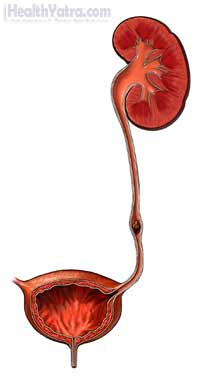تعريف
Hydronephrosis occurs when urine builds up in the kidneys and cannot drain out to the bladder. The kidneys swell from the excess urine. The condition may affect one kidney or both. Hydronephrosis is not a disease itself, but rather a sign of another disease or condition affecting the kidneys. Swelling of the kidneys can lead to kidney damage.
This is a serious condition that requires care from your doctor. Most patients who have hydronephrosis will not know it until it has already damaged the kidney. Therefore, if you are at risk for this condition, it is important to be under the care of a physician.

أسباب
Hydronephrosis is caused by two problems in the urinary system. A blockage may prevent urine from draining out of the kidneys. Or a condition called reflux may cause urine to flow back into the kidneys from the bladder.
Conditions that may cause hydronephrosis include:
- A blockage or defect in the urinary system that is present at birth
- حصى الكلى
- A blood clot
- Scarring of the ureters (tubes that connect the kidneys to the bladder)
- A tumor in the pelvic area (such as bladder, cervix, colon, or prostate)
- بروستاتا متضخمة
- Enlarged uterus during pregnancy
- Persistent urinary infection in the kidneys
- Neurogenic bladder
- Injury to structures in the urinary system (eg, from surgery or trauma)
عوامل الخطر
The following factors increase your chances of developing hydronephrosis:
- Defect in the urinary system that is present at birth
- Cancers in the pelvic area
- Pelvic surgery
- Blood-clotting disorders
- Recurrent urinary tract infections
- بروستاتا متضخمة
- Neurogenic bladder
- حمل
الأعراض
Hydronephrosis may or may not cause any symptoms. If symptoms occur, they may include:
- Pain in the back, waist, lower abdomen, or groin
- Persistent pain with urination or urinary frequency (from urinary tract infections)
- Increased urge to urinate or urinary incontinence
- Dribbling after urination
- حمى
- استفراغ و غثيان
- Unexplained itching
التشخيص
Your doctor will ask about your symptoms and medical history, and perform a physical exam, which may involve examination of the pelvis or rectum to feel for blockages. You will likely be referred to a urologist and/or nephrologist for further diagnosis and treatment.
قد تشمل الاختبارات ما يلي:
- Urine tests—to check for blood, protein, bacteria, or other evidence of damage to the kidneys
- Blood tests—to check for evidence of damage to the kidneys
- Bladder catheterization—a thin tube, called a catheter, inserted into the bladder to try to drain it
- Abdominal ultrasound —a test that uses sound waves to examine the structures in the abdomen (in this case the kidneys, ureters, and bladder)
- Intravenous urogram (or pyelogram)—an x-ray test that uses contrast dye to assess the structure and function of the kidneys, bladder, and ureters (may not be used if kidneys are damaged)
- Computed tomography angiography (CTA) —a type of x-ray that uses a computer to make pictures of the kidneys, bladder, and ureters
- Magnetic resonance imaging (MRI scan) —a test that uses magnetic waves to make pictures of the kidneys, bladder, and ureters
- Cystoscopy —a thin, lighted tube inserted through the urethra and into the bladder to examine the lining
- Voiding cystourethrogram—x-rays of the bladder and urethra taken during urination after contrast dye is placed in the bladder
العلاج
Treatment involves:
- Draining excess urine from the kidney
- Removing the blockage
- Treating conditions that cause blockage or reflux
- Treating infections in the urinary system
Some causes of hydronephrosis resolve without treatment (such as pregnancy andkidney stones).
تشمل خيارات العلاج ما يلي:
- Antibiotics to treat urinary tract infections
- Medications (eg, anticholinergic drugs) to treat neurogenic bladder
- Catheter inserted into the bladder to drain the urine
- Nephrostomy (a tube inserted into an opening in the midsection to drain urine from the kidney)
- Surgery to remove a blockage or correct a defect in the urinary system
- Surgery to remove part or all of the kidney (rare)
الوقاية
In general, the causes of hydronephrosis cannot be prevented. Prompt treatment of conditions that cause hydronephrosis reduces the risk of complications, such askidney failure.
